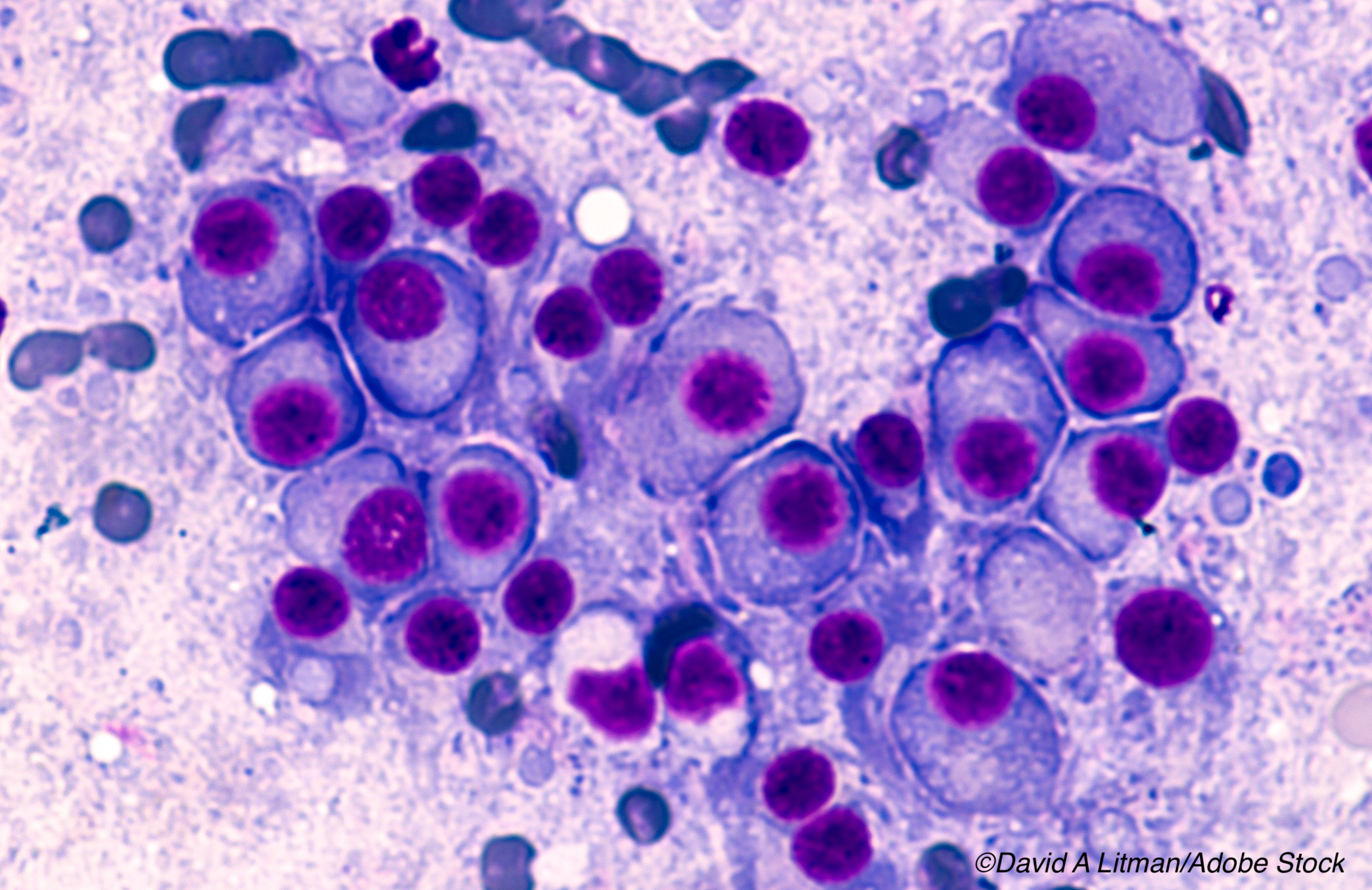A high percentage of patients diagnosed with relapsed or refractory multiple myeloma who have been treated with previous lines of therapy responded to investigative aminopeptide conjugate melflufen in combination with dexamethasone and either daratumumab (Darzalex) or bortezomib (Velcade), researchers found.
Among 13 patients treated with melflufen (melphalan flufenamide), bortezomib, and dexamethasone, the overall response rate was 62% (8 patients) — four of those eight patients achieved a very good partial response or better, and one achieved a complete response in the ANCHOR trial, reported Enrique Ocio, MD, PhD, head of the department of hematology at University Hospital Marqués de Valdecilla, University of Cantabria, Santander, Spain.
Among the 33 patients who were treated with melflufen, daratumumab, and dexamethasone, the overall response rate was 73%, including 10 patients who achieved a very good partial response and two patients who achieved complete response, Ocio reported at the 2020 virtual meeting of the American Society of Hematology.
“Both of the combinations demonstrated encouraging activity,” he said in his oral presentation. “Melflufen plus dexamethasone as a triplet regimen with daratumumab or bortezomib in heavily pre-treated relapsing or refractory multiple myeloma was well tolerated, with a similar safety profile as when used as a doublet — melflufen plus dexamethasone.” Combination melflufen and dexamethasone for relapsed/refractory multiple myeloma received priority review designation from the FDA in August of this year.
“Grade 3/4 treatment related adverse events were mostly hematologic and clinically manageable with dose reductions,” he said. “No dose limiting toxicities were observed across both regimens and melflufen dose levels.”
ANCHOR is a Phase 1/2a, 3+3 design, dose-escalation study of melflufen plus dexamethasone in combination with either daratumumab or bortezomib, Ocio explained. Up to three dose levels of melflufen are being tested, starting at 30 mg and either increasing to 40 mg or decreasing to 20 mg based on observed dose limiting toxicities. About 28% of the patients being treated with the 40 mg dose in the daratumumab arm of the trial discontinued due to adverse events, and on the basis of that observation, Ocio said, “For the daratumumab arm, the safety and efficacy analysis has determined that melflufen at 30 mg should be the recommended dose with daratumumab in future studies. The bortezomib arm of ANCHOR is still recruiting, and the recommended Phase 2 dose is yet to be determined.”
In commenting on the trial results, Wasif Saif, MD, deputy physician-in-chief and medical director at Northwell Health Cancer Institute, Lake Success, New York, told BreakingMED, “Overall, survival of patients with multiple myeloma has doubled due to the introduction of new drugs. However, treating patients with relapsed or refractory multiple myeloma remains a therapeutic challenge even with new drugs, and their disease tends to be more aggressive. The new agent not only nourishes the science behind them with new pathways or technology but also offers more options to these patients.”
Saif said he found the data on melflufen to be encouraging. “Melflufen is a first-in-class peptide-drug conjugate that targets aminopeptidases and rapidly releases alkylating agents into tumor cells. The approved agents daratumumab and bortezomib have non-overlapping mechanisms of action to melflufen, supporting the rationale for combining these agents to overcome therapy resistance. Based on the study presented at ASH 2020, melflufen plus dexamethasone as a triplet regimen with bortezomib or daratumumab has encouraging activity in heavily pre-treated multiple myeloma patients with poor prognostic factors and was well tolerated.”
In the ANCHOR trial results presented at the virtual meeting — necessitated by the Covid-19 coronavirus pandemic, which negated the possibility of an in-person session — Ocio and colleagues recruited patients diagnosed with relapsing/refractory multiple myeloma who were determined to be refractory to or intolerant of an IMiD and/or proteasome inhibitor. The patients also had to have been treated with one to four prior lines of therapy.
The trial restricted patients who were assigned to the daratumumab arm to be naive to prior anti-CD38 monoclonal therapy. Those patients who were assigned to the bortezomib arm could not have been proteasome inhibitor-refractory.
Melflufen was administered intravenously on day 1 of each 28-day cycle. Daratumumab was administered at a dose of 16 mg/kg intravenously once weekly for 8 doses, then every 2 weeks for 8 doses, then every 4 weeks plus dexamethasone 40 mg weekly. Bortezomib was administered as a subcutaneous injection at a dose of 1.3 mg/m2 plus dexamethasone 20 mg on days 1, 4, 8, and 11 plus dexamethasone 40 mg on days 15 and 22. Individuals 75 years or older were given reduced doses of dexamethasone. Patients were treated until disease progressed or the regimen proved intolerable.
Ocio said that in the bortezomib arm, the median age of the 13 participants so far enrolled is 72; about 44% of the patients were determined to have high risk genetics. In the group on daratumumab, the median age of the 33 patients was 63; about 54% had high risk genetics.
-
In early trial results, investigational melflufen in combination with dexamethasone and either daratumumab or bortezomib achieved a promising response and was well tolerated in patients with relapsed or refractory multiple myeloma.
-
These results were presented at a medical meeting and should be considered with caution until published in a peer-reviewed journal.
Edward Susman, Contributing Writer, BreakingMED™
The study was sponsored by Oncopeptides.
Ocio disclosed relevant relationships with Takeda, GSK, Asofarma, MDS, Oncopeptides, Secura-Bio, Sanofi, Amgen, Janssen, and Celgene.
Saif disclosed no relevant relationships with industry.
Cat ID: 332
Topic ID: 78,332,728,791,730,332,468,192,925,331



